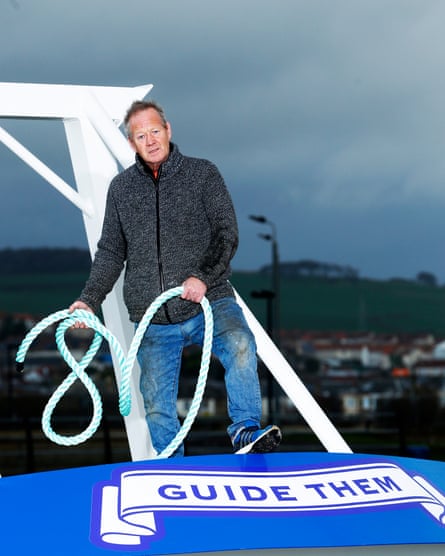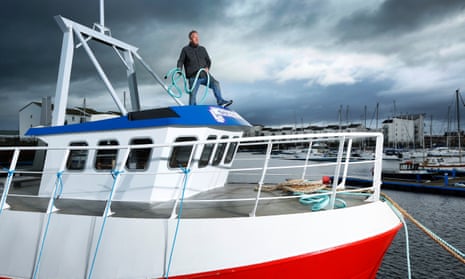It’s a slow sunrise over the Clyde Marina in Ardrossan, on Scotland’s west coast, where Alistair Roberts is fitting the wheelhouse in his new fishing boat, Guide Them.
“It’s the first boat to be built on the Clyde for 14 years,” he says, proudly. “It’ll be up and running at the end of March, just at the bad time,” he adds, referring to the date when the UK is scheduled to leave the EU, regardless of whether a Brexit deal has been reached. “So there’s me who needs their head looked at!”
While he works on the quayside, Roberts has two other boats out on the water, run by six men, including his son, catching prawns. They will land at 6pm, when the catch, which might range from langoustines to smaller prawns for scampi, is taken to Glasgow for processing, then transported to Boulogne to be distributed throughout France.
A lifelong fisherman and, like most of his community, a Brexit supporter, Roberts initially appears sanguine about his industry’s future, particularly in the event of a no-deal scenario: “I think there will be a hiccup for a couple of months.”
However, he admits he does have concerns. “I’ve spent £700,000 on a new boat. I owe the bank money, I can’t afford to have delays at the ports. On the west coast, it’s not just the crew who will be affected, it’s the whole community: the diesel man, the engineer, the netmaker. My boy left school at 16 and he’s now 27. He doesn’t know anything else. I’m worried whether he’s got a future.”
On account of Britain’s steadfastly conservative taste in fish, it exports the majority of its home-caught catch. High-value produce such as that sold by Roberts, including lobster, crab and scallop, and often sold live to upmarket restaurants in France and Spain, is most at risk from the border delays looming after 29 March.
“The transport has to be very quick,” says Ronald Scordia, the managing director at Angelbond, which processes Roberts’ prawn catch. “If the trucks leave tonight they can be on the plate for lunch the next day. But we don’t know what the new customs paperwork will be, especially for live produce. Our concern is losing time, and if that is the case then the only option is to freeze all the produce.”

A Frenchman who has lived in Scotland for 20 years, Scordia says frozen product plunges in value. “Freezing requires a completely different strategy and lots of people are already in that market so there’s big competition.”
As he waves in half a tonne of petrol-blue Skye lobsters for storage in three tiers of temperature-controlled tanks, he vents frustration with the uncertainty surrounding Brexit. “Fishermen were for Brexit because they wanted to protect their waters, so they think access will still be okay. It’s more the processors who are scared about it. The boat goes fishing, they land and they sell, but for us it’s difficult when you buy products and don’t know if you will be able to sell them. And eventually that will impact on fishermen too.”
“Businesses at every part of the supply chain are expressing concerns to us,” says Hazel Curtis, the director of corporate relations for the industry authority Seafish. “There are quite mature businesses that have never exported to a non-EU country, so for them it is a whole new concept, and a whole raft of detail they need to grasp.”
In the longer term, Curtis says the industry will face staffing shortages, with EU nationals making up more than 70% of those working in fish processing in the north-east of Scotland.
Research for Greenpeace, published last October, found 33% of Scotland’s fishing quota was under the control of just five families, which it described as “a wealthy cabal of fishing barons”, all based around the north-east. Indeed, accompanying the debate around Brexit have been calls for the Scottish government to seize the initiative in reforming domestic quota allocation, and consider options such as Norwegian-style community quotas or regional management.
Industry experts including Elaine Whyte, of the Clyde Fishermen’s Association, point out much of the high-value catch is caught by smaller, more vulnerable owner-operated businesses like Roberts. Whyte is blunt about one of the looming threats for her members: protests by French fishermen if the UK crashes out with no deal, resulting in an immediate cessation of EU access to British waters. “I worry about how long our men could last with direct action,” she says – which some fear could even amount to blockades that would paralyse the British industry.
“We are smaller businesses,” she explains, “so if there is a no-deal situation and we have suddenly got high tariffs and people protesting on the continent we would not be able to carry that burden in the way that some of the bigger organisations could.”
Bertie Armstrong, the chief executive of the industry’s largest body, the Scottish Fisherman’s Federation, cautions some may be suffering “Millennium bug-itis” over Brexit. “Most countries are not in the EU and doing perfectly well.”

He urges perspective on tariffs, quotas and even direct action. He concedes, however, that “what frightens everybody is non-tariff affairs: as night follows day the French would register their protest with some form of direct action, but that would be temporary and illegal”.
Given the urgency of transporting live catch, Whyte has discussed contingency planning with colleagues. “The UK and Scottish government are looking at ways of getting into Europe by not going through France, but the freight and ferry links in Scotland aren’t as good as they could be. If you were to set up a freight centre in whichever airport, you’re going to need qualified staff to go through the certification process [for export], it would need to be 24/7, and temperature-controlled and we don’t know what it would look like or how long it would take.”
It’s a lot to set up from scratch in 10 weeks or less.
Fishing in numbers
462,000 tonnes: total weight of fish landed by vessels registered in Scotland in 2017
£561m: total fishing income by vessels registered in Scotland in 2017, representing 58% of UK fishing income
£1.32bn: total fish exports from UK to EU in 2017
Zero: there are currently no plans to charge for the checking and validation of a UK export catch certificate
